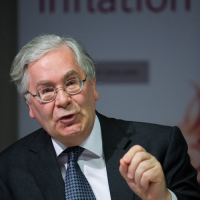
Mervyn King appeared before the Treasury Select Committee this morning to answer questions about the Bank’s quantitative easing (QE) programme and the recent decision to boost the asset purchase facility by £75bn.
MPs are concerned the latest round of QE will drive inflation up further from its current level, 5.2%, and King was asked to provide more details on his recent predictions that it will begin falling back to its 2% target level next year.
He said: “The first thing that will happen as we go into the New Year is the effect of the increase in VAT last January will disappear from the 12-month window used to calculate inflation.
“We’ll see that some of the large energy price increase and fuel prices drop out. Commodity prices have started to fall back.
“That will carry on until the end of the year, then the increase in gas and electricity tariffs that came in the last couple of months will drop out.”
He added these would not be replaced by any “equally large increases in prices”.
Asked why the Bank had chosen not to increase interest rates to bring inflation back to target levels, King said it was in anticipation of these factors.
He added: “The key point for us if we had done that and inflation were a little lower, come next year you’d be giving us a hard time for inflation being well below the target.”
Earlier in the session, King was pressed on why he was not doing more to increase lending to small and medium sized enterprises.
He insisted any credit easing was not the responsibility of the Bank and put the blame on both the current and previous government for not taking advantage of their stakes in RBS and Lloyds.
He also said the “obvious” solution was for the government to use its stakes in Lloyds and RBS to create incentives to increase lending.
During the session, King also revealed the gilts purchased under the quantitative easing programme would begin to mature in 2013 and, if monetary policy has not been tightened by then, the Bank could use the proceeds to buy more assets.
















